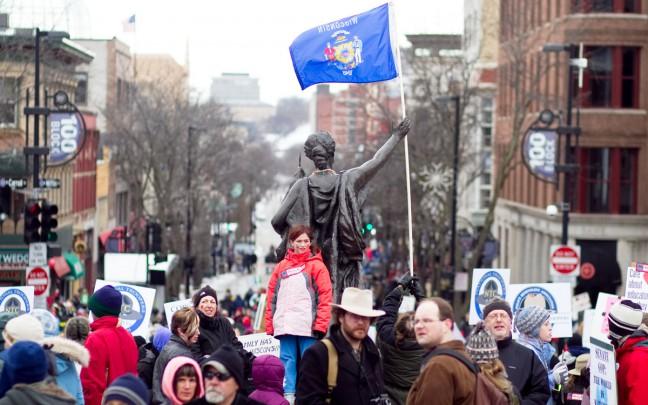Solidarity has been the defining word of the nearly three-week long protests against Gov. Scott Walker’s proposed budget repair bill – a word that was demonstrated in a number of forms at demonstrations at the Capitol this weekend.
Mayoral candidates Dave Cieslewicz and Paul Soglin, long-time competitors, stood side-by-side to address the approximately 12,000 people who gathered outside the Capitol building around 1 p.m. Saturday. Though each gave its own individual speeches, the two applauded each other and shared a common message for Wisconsinites: “We will win.”
Soglin and Cieslewicz urged Walker to come together with the Wisconsin people to develop a common faith in trust.
“The atmosphere here – it’s the joy that you can look at one another and know you the person next to you was someone you had never known before, but you knew that person was someone you trusted,” Soglin said. “Gov. Walker, join us in trust – look at what we have already accomplished.”
Soglin said other states that have governors who were considering instituting similar legislation have backed down after watching Wisconsinites rally against Walker’s bill throughout the past several weeks.
Filmmaker Michael Moore told protesters their fight was not over and had already made an example for the rest of the country. Moore said the protesters had “aroused a sleeping giant,” bringing light to a national struggle for workers’ rights.
“All of America thanks you – thank you, Wisconsin,” Moore said. “You don’t know how impressive it is to the rest of the country to see these 14 senators still refusing to participate in the scam of the century…they have done something absolutely profound, and we will never forget their courage.”
Wisconsinites also heard words of encouragement from Rev. Jesse Jackson who returned to Madison Friday to address the public, Madison’s City Council and labor leaders.
Jackson said the public also had to acknowledge the “profound moral and ethical dimensions to this struggle” and encouraged continued peaceful demonstrations.
“I want to congratulate the workers and the students and the religious leaders for engaging in this fight of social and economic justice – it’s more than just a labor fight,” Jackson said. “We cannot take for granted that it has been a nonviolent disciplined struggle.”
With the exception of one arrest Friday morning, no arrests or reports of violence were made throughout the weekend.
Several rounds of ammunition were found outside three Capitol entrances Thursday, and a number of threats against members of the Legislature and the Executive Branch were made following the ammunition’s discovery, according to a statement from the Department of Administration. Because of the security concerns, the statement said all people who wish to enter the Capitol building would be screened for weapons until further notice.
Elizabeth Ringle of Madison was arrested on charges of disorderly conduct Friday after repeatedly attempting to surpass the security screening, the DOA statement said.
“Ringle continually attempted to get past the screening area without being checked for weapons or prohibited items,” the statement said. “We are trying to balance the security of the public and those who work in the facility.”
After a Dane County judge ruled Thursday evening that DOA had to return the Capitol building to normal public access by Monday, new regulations were created to restrict the items protesters could bring into the building in order to ensure public safety, a separate DOA statement said.
As of Friday, protesters were also prohibited from bringing in coolers, cooking appliances, extension cords, sleeping bags or pillows, musical instruments and noisemakers, signs on sticks and tape, among other items that have been filling the confines of the Capitol for the past three weeks.
Under the provisions of Judge John Albert’s Thursday ruling, DOA officials decided to remove the signs and banners posted on the Capitol’s walls, stairwells, banisters and balconies throughout the past several weeks.
According to a separate DOA statement, 4,653 members of the public were granted entrance to the Capitol Friday. Saturday, 7,385 people passed through the Capitol, while an additional 12,000 marched throughout Capitol Square. As of late Sunday afternoon, about 200 people were inside the Capitol at any given time, and the square’s population was estimated at about 5,700 people.


















